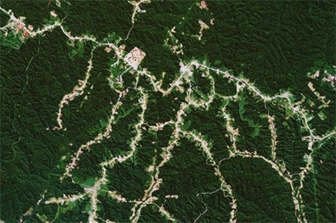Government-subsidized colonization of the Amazon rainforest remains an important driver of forest loss in Brazil, but has mixed economic value, argues a paper published in Biological Conservation.
Carlos Peres and Maurício Schneider review the environmental and socioeconomic costs of Brazil’s agrarian resettlement schemes, which have run from the 1970s as part an effort to to encourage migration from densely settled areas to low population regions. The largest, run by the Institute for Rural Settlement and Agrarian Reform (INCRA), has moved nearly a million families to settlements encompassing 85.8 million hectares of mostly forest land. The impact on forests has been substantial — by 2004 15 percent of all deforestation in the Brazilian Amazon had occurred in INCRA areas. The proportion has since climbed, with some INCRA settlements reaching 70 percent forest loss.
 Fragmentation due to colonization in the Brazilian Amazon. Image courtesy of Google Earth |
Settlers tend to clear forest because they “are typically unfamiliar with local farming practices and are often deprived of appropriate technical assistance, which contribute to the high rate of lot abandonment and turnover, and subsequent demand for new lots,” according to Peres and Schneider. Furthermore the price of land typically increases after clearing, leading settlers “to to sell their land and move on, [which] helps perpetuate the uprooting cycle of ‘land disposal’ in which farmers fail to look after what will not be theirs for long.”
But while the programs drive deforestation, the economic benefits for settlers are less than clear, according to the authors.
“The environmental and monetary costs associated with these resettlement schemes are rarely outweighed by the socioeconomic benefits accrued to translocated farmers,” they write. “At an average start-up resettlement cost of at least US$12,000 per family, this is an expensive development program.”
-
From a macroeconomic standpoint, this strategic investment policy is highly questionable. Brazil was the first tropical country to join the traditional ‘big five’ breadbaskets, but this ‘agricultural revolution’ was largely spearheaded by large rather than small properties. Only 8% of the country’s 5.2 million farms are relatively large landholdings (>100 ha) but they earn 52.5% of the overall farm income. This highlights the sociopolitical polarity between highly productive large corporate farms and myriads of relatively inefficient smallholdings.
In other words, the programs are failing to meet their policy goals, argue the authors, who say that instead of improving the lot of small farmers, they have “condemned thousands of smallholders to persistent rural poverty.” Performance of the schemes is undermined by poor land-tenure governance and poor design and execution.
Thus Peres and Schneider conclude with a call to limit new agricultural settlements to previously deforested areas that are presently used for low-yield cattle pasture; improved law enforcement and forest monitoring programs; and a “truly integrated policy framework” that reconciles conflicting policy goals between different government sectors.
“Above all,” write Peres and Schneider, “both a reorganization of land-tenure law enforcement in settler destination regions and curbing the outflow of migrants from source regions will be central to improving the dismal environmental record of land redistribution policy in Brazil.”
CITATION: Carlos Peres and Maurício Schneider. Subsidized agricultural resettlements as drivers of tropical deforestation. Biological Conservation (2011) doi:10.1016/j.biocon.2011.11.011
Related articles